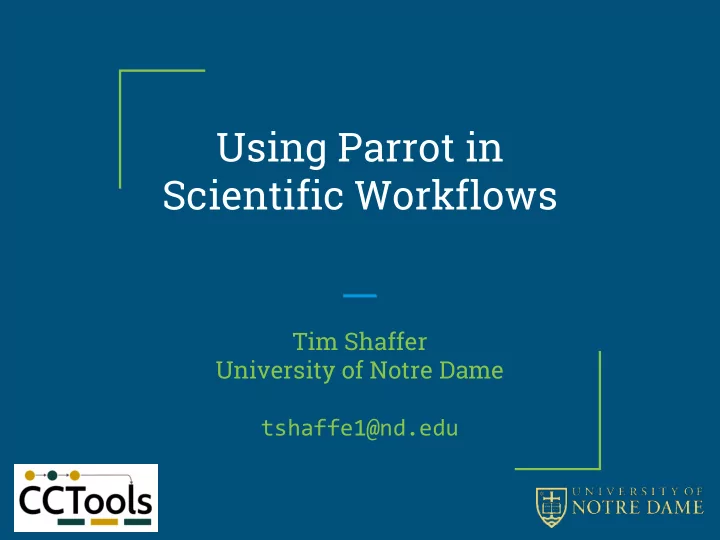

Using Parrot in Scientific Workflows Tim Shaffer University of Notre Dame tshaffe1@nd.edu
Misbehaving Tasks Problem : a large number of temp files are accumulating on workers. Some tasks don't clean up properly before exiting. Enter Parrot : Set up each task with a private /tmp , now it’s easy to identify/clean up what a task left behind.
Bonus: keep tasks from snooping around They probably don't need access to ● /home ● /dev ● /sys ● /proc , maybe others Alternatively, use a more fine-grained approach, e.g. "only allow a Makeflow job to write to the outputs it specified".
Portable Applications It’s hard to know what will be available at the execution site. ● missing libraries ● different filesystem layout (e.g. /bin vs. /usr/bin , or packages installed under /opt ) ● libraries compiled with features missing ● bad ld.so ( really! )
Portable Applications Bundle all dependencies, and use Parrot to set up the filesystem. The app sees a consistent, known-good system configuration. Parrot can automatically detect dependencies and make a package
Example: Portable Python Copying the python binary ● glibc to another computer won’t ● iana-etc work: we need libraries and ● libffi dependencies ● linux-api-headers ● openssl ● bzip2 ● perl ● db ● python ● expat ● tzdata ● filesystem ● zlib ● gdbm
Remote Dependencies Parrot can make remote resources available through the normal filesystem interface. Rather than bundling all dependencies (which could be far more than needed on large projects), let Parrot fetch them on demand. Programs see extra latency on initial access, but only retrieve the parts they actually use.
CVMFS CernVM Filesystem (CVMFS) takes this approach to distribute experiment software. Large, frequently updated codebase accessed daily from grid sites all over the world. No need to explicitly install packages; just start running things, and dependencies are loaded as needed.
CVMFS on HPC High performance computing (HPC) resources might not have an open internet connection and FUSE. For the former, we can run an HTTP proxy on the login node. Since Parrot supports CVMFS, just send a Parrot executable, no FUSE or setuid programs required.
CVMFS on HPC Experiments are highly dependent on CVMFS to deliver software. Long-running, compute-bound tasks don't suffer much performance penalty under Parrot. With Parrot, take advantage of any worker with a working kernel, no need for cluster admins to install extra software.
Questions? tshaffe1@nd.edu http://ccl.cse.nd.edu/software/parrot/
Recommend
More recommend